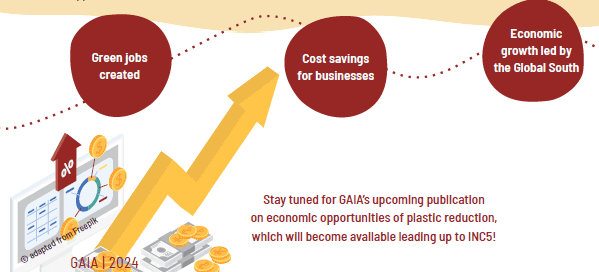By John Ribeiro-Broomhead
As the 26th annual UN climate talks, COP 26, once again turn the international spotlight on classic carbon culprits like energy, transportation, and land use, one major contributor to climate change appears to have slinked away into the shadows. Ubiquitous and looming, this unheralded contributor is part and parcel of fossil fuel use, carbon emissions, and environmental injustice, and can be summed up in just one word: plastic.
If plastic were a country, it would already be the fifth-largest emitter in the world. By 2050, the cumulative emissions from plastic production could reach over 56 gigatons – 10-13% of the entire remaining carbon budget to stay below 1.5C.

These emissions are generated at every step of plastic’s life cycle from fossil fuel extraction to production to end-of-life disposal in incinerators, where they are joined by other toxic emissions and hazardous byproducts.
Plastic’s presence in food packaging and personal products like face scrubs and feminine hygiene products put people at higher risk of cancers, miscarriages, and other ailments. As litter, plastic threatens marine ecosystems and the livelihoods that depend on them, clogs storm drains and causes flooding, and works its way into our soil and even food,,,,, exacerbating stress on many of the systems that the climate negotiations are trying to address. Similarly, air pollution from waste incineration, a common disposal option for plastic, disproportionately impacts disadvantaged communities, including communities of color, that already bear the brunt of many climate impacts.,
Despite popular messaging that stresses the importance of individual behavior in reducing waste and plastic use, the drive for increased plastic production comes from large‐scale investments in new production infrastructure by petrochemical companies. An abundance of cheap, fracked gas, along with the decarbonization of the transportation and energy sectors has made one thing clear to these companies: plastic equals profit. The oil and petrochemical sectors are betting their future on plastic – particularly cheap, hard-to-recycle, single-use plastic – and if they succeed, they will lock in the use of fossil-based plastics for decades to come.
Current efforts to address the flood of plastic, limited to managing waste after it’s already been produced, are equivalent to mopping up the water spilling out of an overflowing bathtub rather than turning off the tap. Top plastic polluters like Coca-Cola, PepsiCo, and Nestlé would like us to think that such an approach can work, investing in false solutions ranging from technologically challenged “chemical recycling” operations to convoluted “plastic neutrality schemes” where plastic waste is burned as fuel in cement kilns. There’s even been talk of plastic being part of international efforts to reach “net zero emissions.” But end-of-pipe approaches simply will not work. In the face of such an overwhelming glut of fossil fuel use, we need to tackle climate and plastic pollution at its source by replacing single-use products with accessible, reusable options for all.
It is clear that we cannot rely on plastic polluters to clean up their act without outside intervention. Decision-makers must step up to curb the twin fossil fuel and plastics industries, replacing the single-use plastic regime with a zero waste circular economy where single-use products are kept to a minimum. However, a recent analysis of Nationally Determined Contributions (NDCs)–how each country will help the planet reach the 1.5 degree target to avoid climate collapse–shows that over a quarter of countries fail to recognize tackling waste as a key climate strategy. Only 11 countries propose bans or restrictions on the use of plastic, and none propose to restrict the production of plastic. Not only does this omission undermine our ability to stabilize the climate, but it is a huge missed opportunity to create millions of good jobs, save money, and ignite a just transition for formal and informal workers around the world who currently handle plastic.
The path forward is lit by grassroots action, national-level product bans, innovative reusable alternatives in the business sector, and greater accountability in the global plastic waste trade. Strong policy action will be required to reinforce and expand these promising efforts, and decision-makers at COP 26 and at home need to step up on plastic to ensure a clean, healthy, and stable climate. It’s time to turn off the tap on plastic production.
John Ribeiro-Broomhead is a recent graduate of Stanford University’s master’s program in Atmosphere and Energy Sciences, with a continued interest in the interactions between climate, air quality, and human health.




























